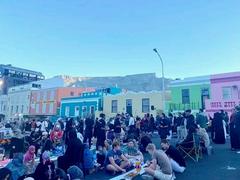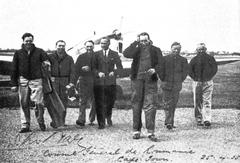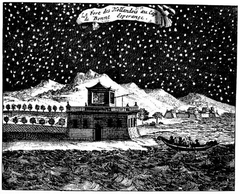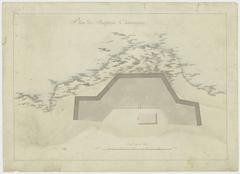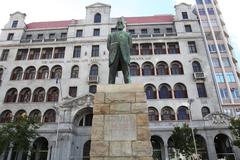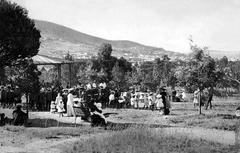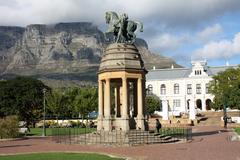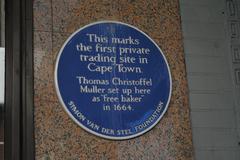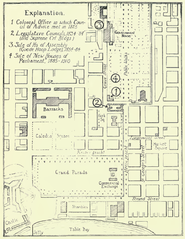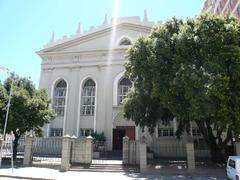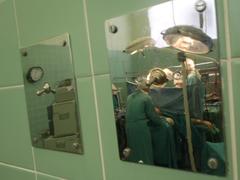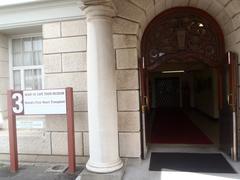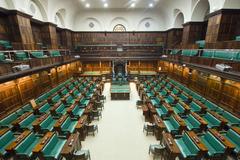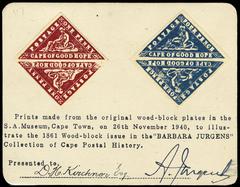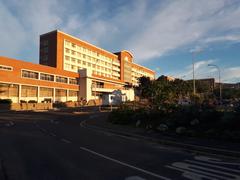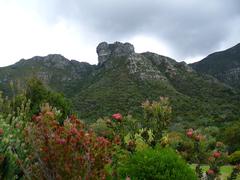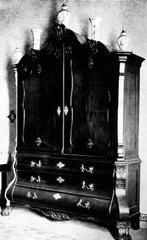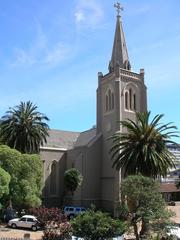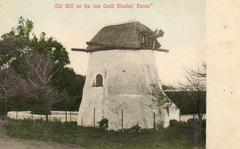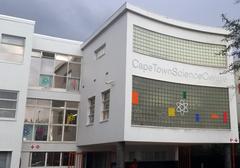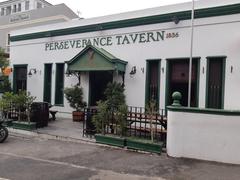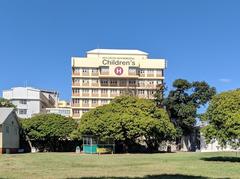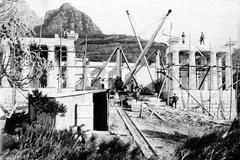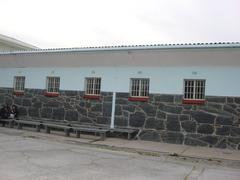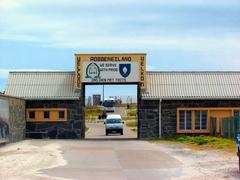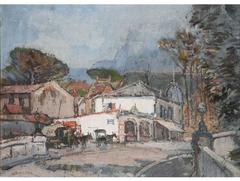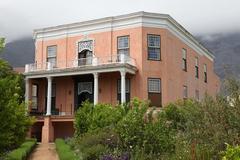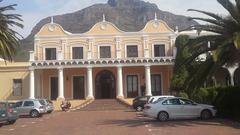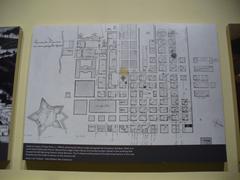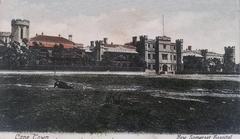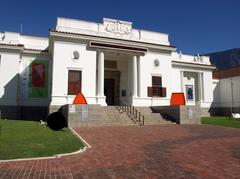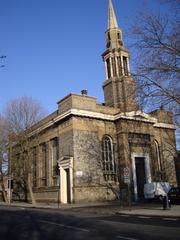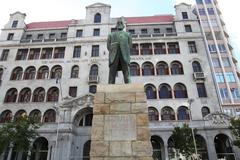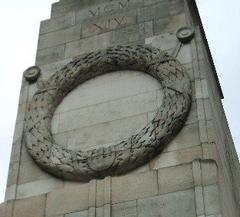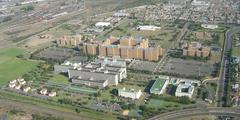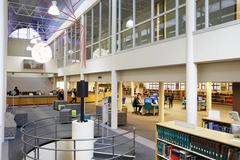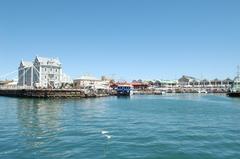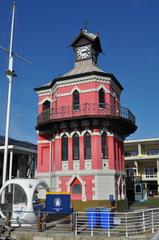Little Theatre Cape Town: Visiting Hours, Tickets, and Historical Sites Guide
Date: 14/06/2025
Introduction
The Little Theatre Cape Town, located on the University of Cape Town’s historic Hiddingh Campus in the Gardens district, stands as a living testament to nearly a century of South African performing arts heritage. Established in 1931 by Professor William Henry Bell, this intimate venue has grown from a repurposed chemistry laboratory into a dynamic cultural hub. Today, it blends architectural character, technical sophistication, and vibrant programming, making it a must-visit destination for theatre enthusiasts, students, and tourists eager to experience Cape Town’s creative heartbeat (ESAT, UCT Centre for Theatre, Dance & Performance Studies, SA-Venues).
This comprehensive guide details the theatre’s origins, unique features, visiting hours, ticketing, accessibility, nearby attractions, and practical tips—ensuring a seamless and enriching visit.
Table of Contents
- Historical Overview
- Architectural and Artistic Features
- Role in Cape Town’s Cultural Landscape
- Visitor Information
- Nearby Historical Sites and Attractions
- Practical Travel Tips
- Frequently Asked Questions (FAQ)
- Conclusion and Call to Action
- Visual Gallery
- References and Further Reading
Historical Overview
Origins and Early Development (1931–1940s)
The Little Theatre opened its doors in 1931, established under the vision of Professor William Henry Bell. Originally a converted laboratory, the theatre was designed to serve as a training ground for drama and opera, with its first performance being Chekhov’s The Seagull. Its intimate setting, seating under 200, fostered a close connection between performers and audience—a hallmark that remains today (ESAT).
Expansion and Community Engagement (1930s–1950s)
In response to growing popularity, the theatre expanded its seating to 300 and inaugurated the new space with a production of Mozart’s The Marriage of Figaro. The theatre became a cultural hub, offering free access to local dramatic societies and supporting groups such as the Cape Town Repertory Theatre Society and Kaapstadse Afrikaanse Toneelvereniging (KAT). This era cemented the Little Theatre’s reputation as a nurturing ground for diverse artistic voices (ESAT).
Institutional Changes and Modernization (1950s–1990s)
Governance shifted in 1957, and after a period of renovation, the theatre reopened as the Little Theatre/Arts Center in 1961. It continued to serve amateur and professional troupes alike, underwent significant architectural modernization in 1994, and adapted to changing arts landscapes. Its enduring partnership with UCT’s Centre for Theatre, Dance and Performance Studies ensures its ongoing relevance (ESAT).
Architectural and Artistic Features
The Little Theatre complex comprises three main performance spaces:
- Main Little Theatre: Seats approximately 240, featuring a proscenium stage, raked seating, and advanced lighting and sound.
- Intimate Theatre: Seats 70–80, ideal for experimental and emerging artist works.
- Arena Theatre: Also seats 70–80, offering flexible staging for innovative productions (Wikipedia, UCT Centre for Theatre, Dance & Performance Studies).
The foyers frequently display student art and theatre memorabilia, while the understated interior design adapts to each production’s mood, ensuring versatility and creative expression.
Role in Cape Town’s Cultural Landscape
The Little Theatre has long been a launchpad for South African talent, hosting student and professional productions, and offering a platform for experimentation and cultural exchange (UCT Arts and Culture). Its commitment to accessible programming and inclusion aligns with Cape Town’s broader arts policy, and its location at the heart of the city’s academic and creative district fosters collaboration and community engagement.
Visitor Information
Location and Access
- Address: Hiddingh Campus, Orange Street, Gardens, Cape Town
- Proximity: Short walk from Kloof Street, the Company’s Garden, and other city attractions.
- Transport: Easily reached via MyCiTi bus, minibus taxis, or private car. Street and secure parking are available nearby, though limited during peak times (SA-Venues).
Visiting Hours
- Performance Times: Evenings and weekends, aligned with scheduled shows.
- Box Office: Opens approximately one hour before performances; standard hours are Monday to Friday, 10:00–16:00.
- Special Events: Additional hours may apply for rehearsals, tours, or workshops. Always confirm on the official website or via phone.
Ticketing
- Purchase Options: Tickets available online via Webtickets, at the box office, or at select retail outlets (Pick n Pay, Boxer).
- Prices: R50–R150 for most student/emerging artist shows; R200+ for larger productions. Concessions available for students and seniors.
- Booking Advice: Advance booking is recommended, especially during festivals and university events (SA-Venues).
Accessibility
- Wheelchair Access: Step-free entrances and accessible seating in most venues.
- Facilities: Accessible restrooms, cloakroom, and clear signage.
- Assistance: Braille/tactile signage and audio guides for some shows; visitors with special needs should contact the theatre in advance (Cape Town Tourism).
Facilities and Etiquette
- Amenities: Foyer bar for refreshments, comfortable seating, modern sound and lighting.
- Dress Code: Smart-casual recommended; no formal requirements.
- Conduct: Arrive on time, silence devices, and refrain from photography or recording during performances.
Nearby Historical Sites and Attractions
Enhance your visit by exploring these nearby cultural and historical landmarks:
- Company’s Garden: Historic botanical garden ideal for walks.
- Bertram House: Georgian-era museum.
- Centre for the Book: Literary and reading hub.
- St Martini Evangelical Lutheran Church: 19th-century heritage church.
- Iziko South African Museum & National Gallery: Major cultural institutions within walking distance (SA-Venues).
Practical Travel Tips
- Best Time to Visit: Winter (June–August) offers cozy indoor theatre experiences with fewer crowds and lower prices (Weather25, Rough Guides).
- Nearby Dining & Accommodation: Enjoy Kloof Street’s restaurants, bars, and boutique hotels such as Kloof Street Hotel and iGadi House (SA-Venues).
- Safety: The Gardens area is generally safe, but standard urban precautions apply.
Frequently Asked Questions (FAQ)
Q: What are the Little Theatre’s visiting hours?
A: The theatre is open during scheduled performances, with the box office opening one hour prior. Confirm on the official website or by phone.
Q: How do I buy tickets?
A: Purchase online via Webtickets, at the box office, or select retail stores.
Q: Is the theatre wheelchair accessible?
A: Yes, but confirm specifics in advance for your needs.
Q: Are guided tours available?
A: Occasionally, during special events or by arrangement. Contact the theatre for details.
Q: What types of performances are held?
A: Plays, dance, experimental theatre, and student productions year-round.
Q: Where is the theatre located?
A: Hiddingh Campus, Orange Street, Gardens, Cape Town.
Q: Is parking available?
A: Limited street and secure parking; arrive early during busy periods.
Conclusion and Call to Action
The Little Theatre Cape Town is a vibrant cornerstone of the city’s arts landscape—offering an intimate, accessible, and historically rich environment for experiencing the best of South African performance. Thoughtful planning around visiting hours, ticketing, and accessibility will ensure a seamless and memorable visit. Don’t miss the chance to explore nearby historical sites and enjoy the lively Gardens district.
Plan your visit:
- Official Little Theatre page
- Book tickets via Webtickets
- Download the Audiala app for event notifications and curated cultural content.
- Follow UCT Arts and Culture on social media for updates and community highlights.
Visual Gallery
The historic façade of the Little Theatre Cape Town, an iconic cultural landmark.
Interior view showcasing the continental seating plan and raked stage.
An evening performance capturing the theatre’s intimate atmosphere.
References and Further Reading
- Encyclopaedia of South African Theatre and Performance (ESAT)
- UCT Centre for Theatre, Dance & Performance Studies
- UCT Arts and Culture
- SA-Venues: Little Theatre Cape Town
- Webtickets: Little Theatre Events
- Cape Town Tourism: Limitless Cape Town
- Cape Town Universal Access
- Weather25: Cape Town Weather in June
- Rough Guides: Cape Town Weather in June

